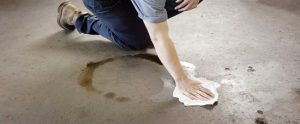Throughout history, garages have grown in their usage and purpose. Originally created as a structure for storing and protecting vehicles, the garage is now a highly versatile, multi-functional space.
It may serve as a storage unit, a designated workshop, an area for arts, crafts, and other hobbies, a recreational area for exercising and engaging in certain activities – such as playing pool or ping pong -, or it may serve as a semi-outdoor living space.
Regardless, the floor space of your garage may come in contact with an immense amount of liquids, chemicals, and other types of debris that may result in direct damage.
To avoid the complications posed by garage floor damage, you should opt for concreate coatings. Continue reading to learn more.
Damage-Causing Agents
If you have a garage that serves many functions, there are many damage-causing agents that the floor of the structure may encounter. This include – but, are not limited to – the following:
- Chemicals from Roadways – If you live in a particularly cold region, it is likely that the roadways there are covered in a multitude of chemicals and/or roadway salts in order to make driving a bit easier during the winter and early spring months. Unfortunately, what your vehicle encounters while out and about it will drag back into your garage. When on a garage floor, they transition into a type of liquid-based brine, which then seeps into the pores of the flooring. This could result in severe damage to the flooring and cause freezing and thawing cycles that can enhance that damage.
- Fluids from Engines – Every engine that comes in contact with your garage floor – be it from a vehicle, a lawn mower, a weed eater, or similar device – will include fuel, transmission fluid, oil, and usually antifreeze. If these leak from the engine in which they are a part of, they will not only cause stains, but will cause your concrete flooring to experience a type of degradation – all of which are highly damaging.
- Water – A concrete floor is a highly porous floor. When it is subjected to water, it will pull that water in through a wicking action. This will create dark spots and may even result in white minerals appearing.
- Lack of a Vapor Barrier – Many homeowners pour concrete slab flooring for garages directly on the gravel, while failing to put in a protective vapor barrier. If this happens, water vapor infiltrates the flooring. As a result, the concrete may start to pit, crumble, or engage in the process of spalling.
- Sweating – If the ground is cold, the concrete allows it to permeate through in order to cool the surface of the flooring. If the air temperature in the garage is warm and/or has a high level of humidity, it results in condensation on the floor. In turn, this results in moisture damage.
Protecting Your Garage Floor
Now that you are familiar with a few of the damage-causing agents, you know the importance of concrete coatings.
There are a multitude of epoxy-based sealants that will protect your garage floor from all of the damaging agents in comes in contact with, over time. These come in a wide variety of styles to match any décor and/or preference.
For more information, contact us at: 706-249-4131

